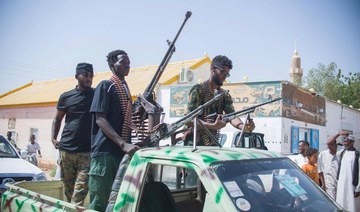ANKARA: The UK and Turkiye have unveiled a deal aimed at tackling the pressing issue of migration in the Mediterranean region.
The announcement, reported by Reuters on Wednesday, has ignited fresh discussions surrounding the potential impact of the agreement on Ankara’s already weighty humanitarian responsibilities.
The Turkish government has not yet officially reacted to the alleged deal.
Against the backdrop of upcoming elections in both nations, the refugee crisis remains a paramount concern, prompting the governments of the UK and Turkiye to commit to curbing the influx of migrants crossing their borders.
The pact is poised to usher in augmented financial support and aid from the UK to Turkiye, specifically earmarked for bolstering efforts at migrant management.
This aid will encompass a comprehensive spectrum of initiatives, possibly ranging from enhancing maritime border security training to deploying state-of-the-art customs detection equipment.
A recent investigation for The Guardian revealed that the UK provided more than £3 million ($3.8 million) in funding to Turkish border forces in the last year to prevent UK-bound migrants.
The contours of the accord also encompass provisions for sharing customs data, conducting joint police operations to dismantle human-smuggling networks, and disrupting the supply chain responsible for ferrying hundreds of small boats and related components across Europe.
The agreement presently does not address the repatriation of failed Turkish asylum-seekers. Indeed, there remains a lack of formal return protocols between the two nations since Brexit.
Turkiye has hitherto only entered into an arrangement with the EU for the readmission of irregular migrants who have traversed its territory.
British Immigration Minister Robert Jenrick undertook a recent visit to Turkiye in preparation for the landmark accord.
British Home Secretary Suella Braverman said: “This partnership with our dear ally Turkiye will enable our law enforcement agencies to collaboratively address this international challenge and disrupt the illicit small boat supply chain.”
Turkiye has the busiest border crossing in Europe at Kapikule, and some 1,486 Turkish nationals in small boats have attempted to gain entry to the UK via the English Channel in the first seven months of the year, second in number only to Afghans attempting the crossing.
The British government has unveiled plans to establish a “center of excellence” under the aegis of the Turkish National Police.
This endeavor is geared toward fortifying collaborative ties between the two countries’ authorities and expediting the exchange of real-time intelligence relating to refugees.
Turkiye’s current status as a non-designated “safe home” country, under the Illegal Migration Act, has prompted the realization that the UK Parliament will necessitate amending its legislation to incorporate Ankara into the list.
This anticipated amendment is expected to spark impassioned debate.
Under the act that passed last month, the home secretary is tasked with detaining and removing those arriving in the UK illegally, either to Rwanda or another “safe” third country.
Jon Featonby, chief policy analyst at the Refugee Council, tweeted: “The forthcoming small boats agreement appears to incorporate a repatriation arrangement with Turkiye that could prove inconsequential once the Illegal Migration Act comes into force.
“This legislation stipulates that Turkish nationals seeking asylum cannot be repatriated to Turkiye.”
This momentous accord is poised to command center stage during the forthcoming UK-Turkiye Migration Dialogue, scheduled to convene in London this autumn.
In a parallel development this week, the UK has begun to house asylum-seekers on a barge, Bibby Stockholm.
On Friday, migrants were temporarily removed from the barge after traces of Legionella bacteria were found in the water system on board.
The move was part of the government’s controversial plan to deal with the large numbers of people arriving in the UK on small boats, and to reduce the amount of money it spends on accommodating refugees.
Ahead of local elections, the Turkish police force is expected to ramp up operations against irregular migrants in the country and to further target human smugglers by combating migration routes.
Turkish Interior Minister Ali Yerlikaya recently announced that Turkish police had conducted over 2,000 operations in the fight against smuggling networks, and arrested more than 1,300 people.
Basak Yavcan, head of research at Migration Policy Group in Brussels, thinks that the UK is employing a general externalization policy with many countries around the world.
“The consequences of this policy with France off Calais on France’s northern coast have produced major human rights violations,” she told Arab News.
Migrants still continue to try to cross the English Channel to reach the UK despite an agreement between London and Paris to boost police enforcement capacity.
According to Yavcan, this policy has not proved to be very effective because it does not address the root causes of migration.
She said: “In the past, it backfired vis-a-vis Belarus and Morocco. It creates human rights violations because it allows these third countries to deal with illegal migration as they wish.
“If the UK foresees something like it did with Rwanda in the future, this may create a case where Turkiye becomes a country where migrants are kept in large quantities.
“It is also problematic to call a country as a ‘safe country’ where still very large groups of refugees come to Europe based on human rights concerns.
“Every refugee application is individual. There could be cases in which individual applicants could face certain persecution risks based on his/her peculiar circumstances.”
Begum Basdas, Amnesty International researcher at the Europe Regional Office, believes that there is nothing the UK government will not do to make people seeking asylum feel unwelcome and unsafe.
“We must acknowledge that Turkiye continues to host the highest number of refugees in the region, and it is important for the international community to share responsibility, not shirk it,” she told Arab News.
“There’s a backdrop of rising anti-refugee racist rhetoric by politicians in the UK and Turkiye — there’s also increased unlawful returns of refugees, so any deal struck with Turkiye must put human rights at the center.”






















